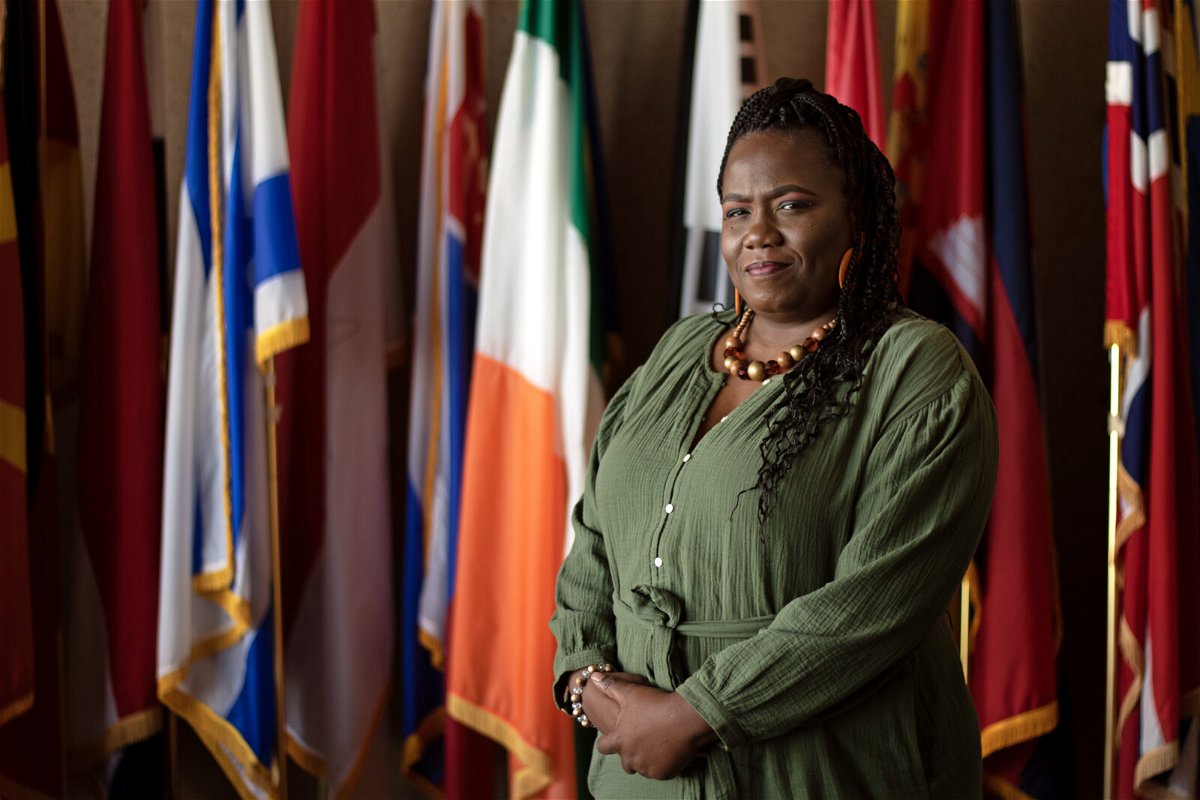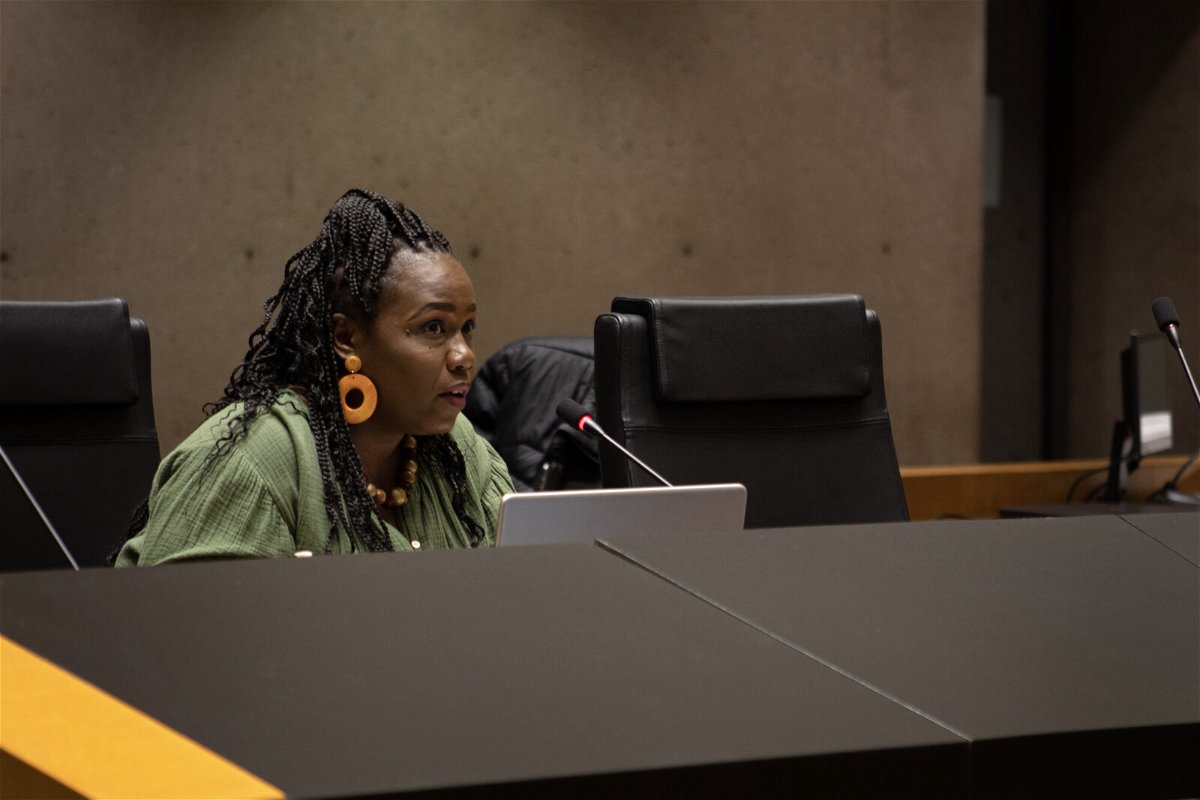South Dallas District 7 has a new plan commissioner — Tabitha Wheeler-Reagan. Councilmember Adam Bazaldua appointed Wheeler-Reagan in December to replace Benjamin Vann, who resigned in November, about a week after South Dallas’ last community rezoning meeting about Watermark Church. He’d served South Dallas for a year and a half.
Wheeler-Reagan will join 14 plan commissioners, appointed by the Dallas Mayor and City Council, to hear zoning cases and make recommendations to the Council. Zoning ordinances guide how land can be developed in terms of the use, size and shape of structures. The council has final say on what zoning cases are approved.

Wheeler-Reagan, who lives off of Malcolm X Blvd, says she’s excited for the new opportunity. She sees a future for herself as an urban planner. This spring she will attend the University of North Texas to pursue a degree in urban policy and planning while simultaneously taking on her new role as a plan commissioner.
Dallas Free Press Report for America corps member Jeffrey Ruiz sat down with Wheeler-Reagan to talk about her new role as District 7’s Plan Commissioner.
Q: How has your work serving as co-chair for the South Dallas/Fair Park Area Plan prepared you for your new position as City Plan Commissioner (CPC)?
A: Not having the formal education in zoning and urban planning, but having the grassroots understanding, it allows me to see things a little differently. To be able to work with developers and applicants to try to always find common ground, especially if they own the property. To see what we can do [to help] before it’s a no-vote.
I want to see our communities grow in a way that doesn’t harm the current residents, but does help improve the quality of life. A lot of times that starts at a zoning hearing.
Q: How does your new position affect your involvement with the South Dallas/Fair Park Area Plan?
A: I actually had to step away. While they’re going through the second phase to add changes to the planned development, I won’t be a part of that. If I’m a part of that, then I can’t vote. When I hear about it [the area plan changes], it’ll be for the first time just like all the rest of the commissioners.
The public hearing for the area plan to make changes to the current PD will come up in six months or by the end of this year.
Q: How has growing up in South Dallas set you apart as the CPC for District 7?
A: To be in a position that is not compensated financially — to be able to serve in that role — you really have to love the position because you’re going to be making a great sacrifice. Not to say that our former commissioners didn’t love South Dallas, but I love it in a way that if I could do anything it would be zoning, planning and teaching other communities how to have a voice. So to be able to fill this position, for me, it’s ecstatic.
It gives everyday people, who live in the neighborhood and are involved in wanting to see growth, a voice. I can help explain to the community what you can possibly do.
Q: You’ve been very vocal about the zoning process of Watermark South Dallas, and were the first person to question their zoning application at their last community zoning meeting. You also asked them to re-evaluate their approach to bring new programs and resources to the surrounding community. How is the zoning process progressing?
A: After speaking with Pastor Marvin Walker, Watermark Community Development Corporation executive director Carson Smith and Masterplan representative Karl A. Crawley, I think that Watermark took a step back and has been able to see it from a community perspective. Anyone that owns property, you think about your property first, but it’s great when you think about everybody’s property and how we become a team and create this destination. Especially during the time when that is a focus area anyway [as part of the South Dallas/Fair Park Area Plan].
There is another Watermark South Dallas Community Meeting Thursday, Jan. 12, at the Exline Recreation Center. It was a mutual decision between Councilmember Bazaldua and the Watermark South Dallas group to give community members another opportunity to provide feedback on the church’s proposed zoning plans.
Q: How does that form of thinking translate into potential rezoning for the rest of South Dallas?
A: We can’t get rid of developers. When property is bought, someone owns it and they want to do what they want to do. I think we need to become more focused on solutions.
If I was a property owner and a developer, I want something that lasts a long time. So why wouldn’t I think about making something that the community can get behind that can be long standing? If we start taking on those perspectives: Let’s meet those developers, and let’s see where we can go. If it’s someone that doesn’t want to be inclusive, then we have a problem. We have got to start doing more solution-based [thinking] because we know the difficulties.
We know the redlining and everything that’s wrong, but I think we definitely start out at getting solutions. We have to be in positions to be able to do that. I want to be someone that says, “Let’s figure it out.” We do need some new apartment complexes. We need a couple of other things in South Dallas, but we got to start meeting at the line.

Q: How would you encourage everyday residents to engage with rezoning meetings?
A: First of all, we need people who already go to meetings to be more inviting. We need our community to start coming so that they can get educated on what is going on because a lot of times, we don’t know. I would encourage those members of the community to come who don’t think that their voice counts. At the local level, your voice is louder than any other level of government.
They need to come into an environment that if we’re fighting, we’re not fighting each other — we’re fighting for a cause.
If you speak English and some of your neighbors don’t speak English, then come out and tell your council member. Whatever nationality or race, come out and say we need someone to interpret — that’s your right. You shouldn’t have to sit in meetings and not understand. We need our Brown and Black [neighbors] to work together in our communities because we’re very much in close contact now.
Q: What do South Dallas residents need to know about you stepping into this new position and what opportunity that provides them?
A: I love South Dallas. There’s no way you can mistake where I’m from. I am from Bonton — a Bontonian. South Dallas is engraved in me. I’ve seen things growing up that I didn’t know were issues. Now that I know, I want to be the best that I can possibly be for South Dallas
What we do now affects those nieces, nephews and kids 20 years from now. The impact that I make now, we need to get it right. Over the last two years, I’ve grown so much. Especially, knowing how to work with people. This particular group of commissioners will help me because it’s 15 people from all over Dallas, and we’re having to make decisions on areas that we don’t live in. To hear their points of view and to hear the question that they’re asking, I am definitely here for it.
Wheeler-Reagan talked about some other things that she hopes to do as commissioner including:
- Ensure that meetings that are scheduled actually happen
- Set aside one day a week to talk to applicants
- Do site visits for proposed zoning changes
- Make sure neighbors are aware of the developer’s plans
This interview was edited for clarity and length.

My baby girl is making history Father God keep her covered
Father God Thank you for placing an individual in office that knows the community and is genuinely concerned and care about the people and the development of this community, I pray that our heavenly Father will always be with you commissioner Ryan allow you to do great things in your life for this community for his people a change is greatly needed and if anyone can do it I know without a doubt that you can through the statues of our heavenly father may they be with you every decision that you make moving forward every Blessing Grace and mercy favor of South Dallas this people may bless your life greatly you will be a beacon for his people and they will know and they will accept you in this leadership position to make change as well as your peers those that you have to work with will be as supportive as you need them to be to get things done it is in Jesus name as I pray over you with all that you made into her and go through to make great things happen I always see the vision always see the people that you always always seek gods approach guidance and direction with Jesus name I pray so proud of you young lady I’m